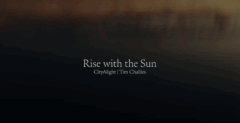One of the most important books I have ever read is a book about joy and wonder. Steve DeWitt’s Eyes Wide Open impacted me in many ways, but perhaps foremost by opening my eyes to the beauty behind the beauty. Here is a short quote in which he describes our problem with beauty.
Creation is beautiful precisely because its Creator is beautiful. God defines beauty by His very essence. He is the source and standard of all beauty. But the concept of God’s beauty is hard for us to imagine. For one thing, God is spirit, a reality that in itself poses problems; we are limited in our ability to understand God’s beauty in that our experience of beauty is essentially sensory. We cannot see God or smell God or touch God. He is “the invisible God” (Colossians 1:15).
Yet this invisible God has chosen to express the fullness of His beauty in physical ways. The display is not the beauty itself. We must not confuse God’s expression of His beauty with its essential character. That would be like mistaking a woman’s taste in fashion for her virtue. The created world in all its beauty is an expression of God’s beauty, but it is not the essence of His beauty. (Although if God’s visual display of His beauty in creation is so awe-inspiring, imagine how wonderful His essential beauty must be!) We are accustomed to thinking about beauty as visual; to think of God as beautiful requires a definition that goes beyond the senses to the quintessence—core—of essential beauty.
Our second problem with understanding the beauty of God is that beauty is generally viewed as a category of personal preference. When judging beauty, people often say, “Beauty is in the eye of the beholder.” Our assessment of the beauty of an object or person is shaped by cultural influences and perceptions. …
Studies show that we are heavily influenced by our parents’ and our culture’s definitions of beauty. These factors make it difficult for us to consider the beauty of God, which doesn’t fit into cultural or conditioned categories of thinking. God’s beauty is divine, eternal, and infinite. He is beautiful. He always has been and eternally will be.
Our final difficulty is that God’s beauty defies our ability to comprehend. A helpful word in grappling with divine beauty is ineffable. This word is one of the few that apply because it means “beyond comprehension.” God transcends all aesthetic definition. Human language cannot produce a word that adequately describes something infinitely desirable. A popular phrase captures the ineffability of God’s beauty: It blows our minds. We cannot see God’s beauty (God is spirit); we cannot evaluate it (God transcends humanity’s ability for critique); and we cannot comprehend it (God is infinite, and we are not).
So why even attempt to wrap our minds around the beauty of God? … We seek expressions of beauty because what we can see and comprehend draws us to wonders too awesome not to enjoy. Their ineffability is entwined with their desirability. What I cannot see is mysteriously interesting to me and compels me to look all the more. The same is true of God’s beauty and attributes.










